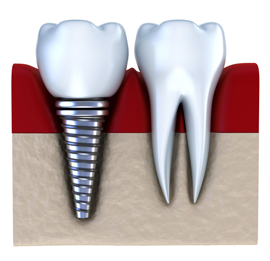
There’s a commonly quoted saying, “Smile and the world smiles with you.” Unfortunately, if you have suffered the trauma of tooth loss, a simple smile can be such an embarrassing experience that you’d prefer not to share it with the world. Perhaps you have been living with the fear that those around you will judge you based on the gaps and spaces in your smile. Maybe social situations are uncomfortable for you, as you question whether someone is focusing on your teeth more than your eyes.
Experiencing the loss of a tooth can induce anxiety, embarrassment, and it can present lots of unpleasant challenges. The team at Howl Dental wants you to know that there is a simple solution for your tooth loss woes.
Dental implants make chewing easier and more productive, create a network of support for bridges, help to stabilize your teeth, and can prevent bone loss.
When you take advantage of modern dental technology, you won’t have to compromise on the function or appearance of your smile at all. A dental implant is comprised of a titanium post that serves as an artificial tooth root and holds a dental crown in position. After decades of unprecedented consistency, more than 90% of dental implant cases are successful.
Along with improving your self-esteem, dental implants make chewing easier and more productive, create a network of support for bridges, help to stabilize your teeth, and can prevent bone loss.
For your convenience, Dr. Howl works with top oral surgeons in Tulsa who perform implant surgery as well as complete restorative work. Our office will coordinate your consultations so there is no need to drive around town scheduling or coordinating your treatment and insurance benefits with other doctors.
We invite you to contact us today to find out more!
Dental implants are titanium components used to replace the roots of teeth. Embedded into the jawbone, an implant is ultimately used to support restorations like crowns and bridges. A series of dental implants can also anchor a denture for those in need of a full arch of replacement teeth.
The restorations and prosthetics attached to dental implants fill in the visible portions of teeth and provide a sturdy biting surface for chewing food. When crowns, bridges, and dentures are constructed from tooth-colored materials, patients enjoy a lifelike, beautiful smile.
Unlike other tooth replacement options, a dental implant and its accompanying restoration or prosthetic provide a structurally complete artificial tooth.
Dental implants can help millions of people, but they aren’t right for everyone. Some pre-existing health conditions like diabetes or advanced gum disease could make successful implantation difficult. Those who have lost significant bone mass in the jaw may also need to pursue other tooth replacement options. Adequate bone is an essential component of an implant succeeding. This is because implants draw on support from the jaws, much like a biological tooth does.
Determining a person’s candidacy for this procedure will involve a consultation with an implant dentist. Consultations include physical examinations, diagnostics, and a review of a patient’s health history.
Bone loss is a common side effect of losing teeth. When the bone is not stimulated by the roots of teeth, the body will begin to resorb bone. Fortunately, the body responds to implants the same way it responds to teeth. After bone integrates to an implant, it is locked in place. Dental implants will provide the stimulation the jaws need to retain bone structure.
Losing bone in the jaw causes a host of unwanted effects. It will contribute to accelerated aging, place strain on the TMJ and its supportive muscles and connective tissues, and reduce oral function.
Dental implants are quite versatile. They can support restorations and prosthetics. For patients in need of single tooth replacement, a crown attached to an implant provides a structurally complete replacement tooth. When multiple teeth in a row are missing, dental implants can be used to anchor a bridge. When patients are missing a full arch of teeth, implants can be embedded throughout the jaw to support a full denture.
The cost of dental implants varies from person to person. Costs fluctuate depending on how many teeth require replacement and whether a patient needs treatments, such as a tooth extraction or bone graft, prior to receiving dental implants. After a consultation, our practice can provide estimates that reflect the unique needs of a patient.
